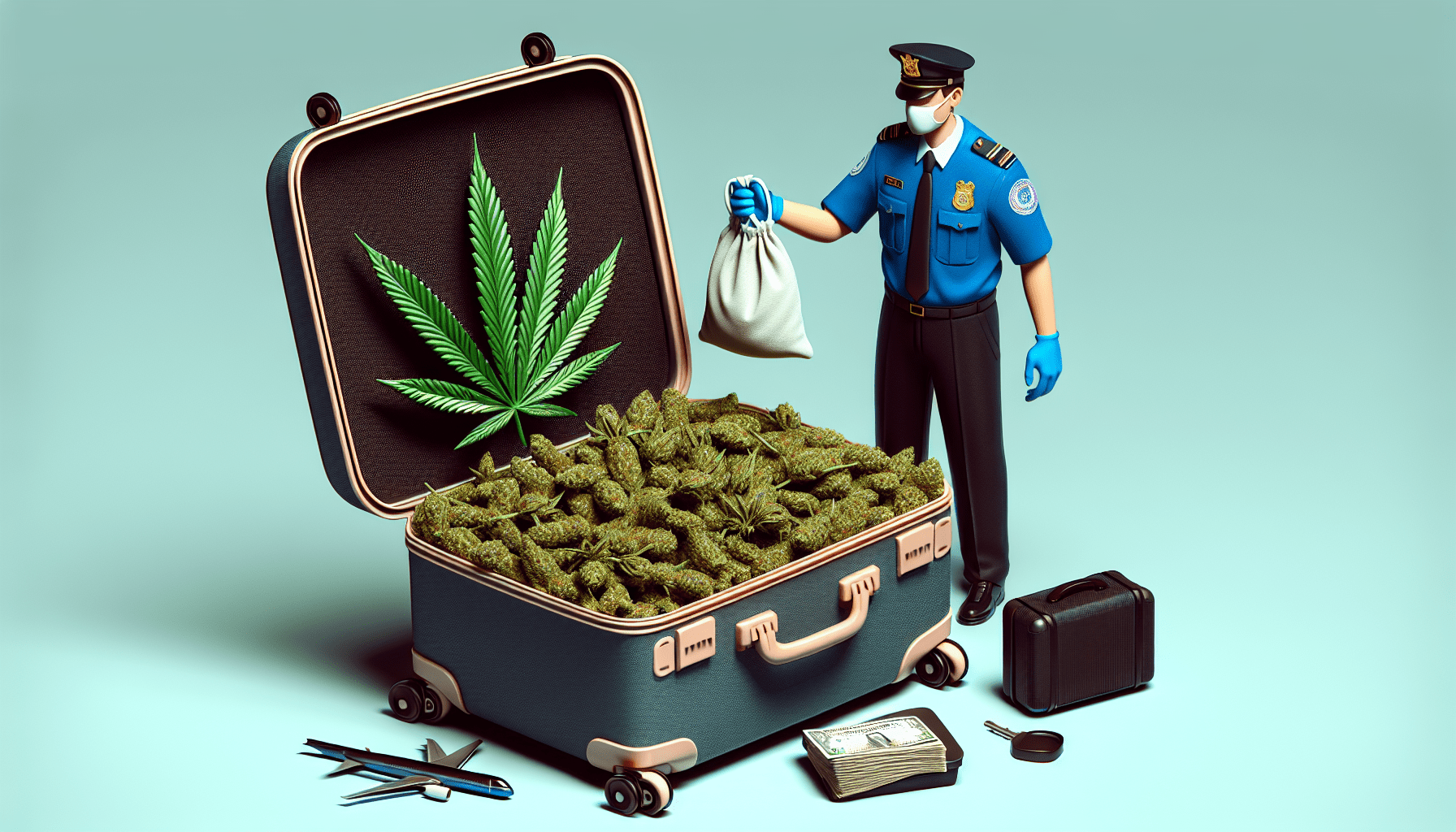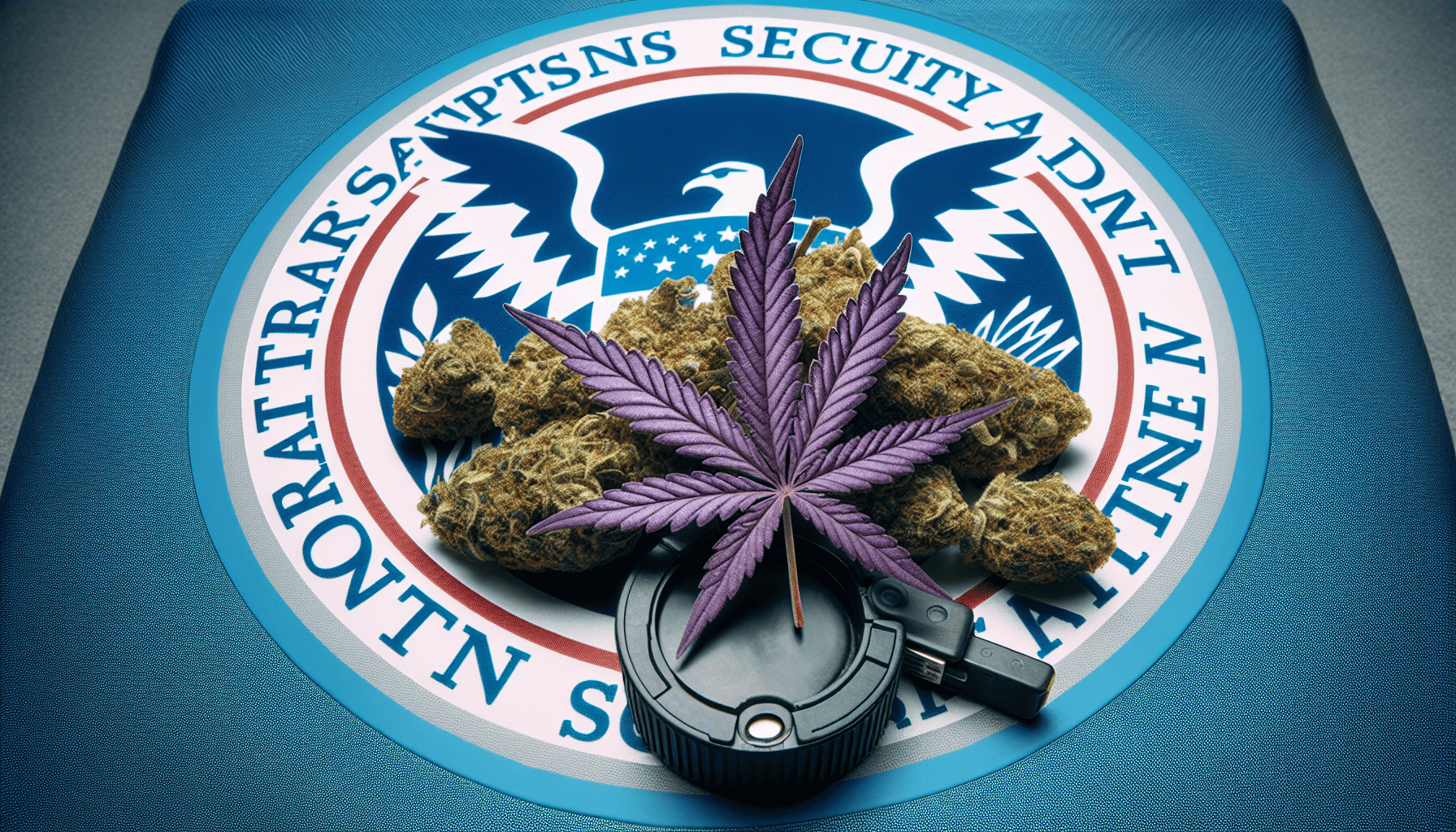BAODINI Travel Mini Umbrella for Purse With Case Small Compact UV Sun Protection Sun Lightweight Tiny Pocket Umbrella for Women Kids and Men
$10.77 (as of April 23, 2025 06:52 GMT +00:00 - More info)If you’re planning a summer getaway in the United States and you use marijuana for medicinal or recreational purposes, you may be curious about what would happen if TSA found weed in your luggage. While the rules and regulations surrounding cannabis in the US can be confusing, it’s important to be informed to have a smoother travel experience. Although marijuana is legal for medicinal use in 38 states and for recreational use in 24 states, it is still illegal under federal law. The Transportation Security Administration (TSA) official stance is that weed is mostly illegal, so you cannot bring it through TSA even if you’re traveling between two states where it’s legal. However, it’s reassuring to know that TSA’s focus is primarily on safety concerns rather than busting individuals for marijuana. So, let’s explore what actually happens if TSA finds weed in your luggage, and how you can navigate the situation calmly and compliantly.
Shop These Accessories for a Comfortable Trip
Overview of Cannabis Laws in the United States
Medicinal use legalization
In the United States, the legalization of cannabis for medicinal use varies by state. As of 2023, 38 out of the 50 states have legalized marijuana for medical purposes. This means that individuals with certain medical conditions or symptoms can obtain a medical marijuana card and purchase cannabis products from licensed dispensaries. However, the specific requirements for obtaining a medical marijuana card and the conditions that qualify for its use may differ from state to state. It is important to research and understand the laws in your particular state before using cannabis for medicinal purposes.
Recreational use legalization
While marijuana is legal for medical use in a majority of states, the laws surrounding recreational use differ. Currently, 24 states have legalized recreational cannabis, allowing adults over the age of 21 to possess and use marijuana for personal enjoyment. Some states even allow for the cultivation of a limited number of plants for personal use. However, it is crucial to note that each state has its own set of regulations regarding possession limits, where cannabis can be consumed, and purchasing restrictions. It is essential to familiarize yourself with the laws of the state you are visiting or residing in to avoid any legal issues.
Cannabis tourism
With the legalization of recreational cannabis in several states, cannabis tourism has become a growing industry. Many individuals are interested in visiting states where marijuana is legal to experience the local cannabis culture and enjoy the benefits of legalized recreational use. Some states, such as Colorado and California, have embraced cannabis tourism and have established cannabis-friendly accommodations, events, and tours. It is essential for cannabis tourists to research the local laws and regulations, as well as any restrictions on public consumption or transportation, to ensure a safe and enjoyable trip.
Federal law and controlled substance classification
Despite the legalization of cannabis in various states, it is crucial to understand that marijuana remains illegal under federal law. The federal government classifies cannabis as a Schedule I controlled substance, putting it in the same category as heroin and LSD. This classification means that marijuana is considered to have a high potential for abuse and no accepted medical use. While the federal government has taken some steps towards reclassifying cannabis to a less strict classification, it still remains illegal at the federal level. It is important to be aware of this disconnect between state and federal laws when navigating cannabis use and travel.
Conflicting state and federal laws
As mentioned earlier, the differences between state and federal laws regarding cannabis can create confusion and potential legal issues. While some states have legalized cannabis for medical or recreational use, federal law still considers it illegal. This contradiction can have implications for individuals who travel across state lines or engage in activities involving cannabis that may be legal in their state but not federally. It is important to be mindful of the potential consequences and legal ramifications when it comes to complying with both state and federal laws pertaining to cannabis.
TSA Regulations and Procedures
TSA’s role and mission
The Transportation Security Administration (TSA) is an agency of the United States Department of Homeland Security responsible for ensuring the security of the nation’s transportation systems, including airports. The TSA’s mission is to protect travelers and ensure freedom of movement for people and commerce. TSA agents are trained to detect and prevent potential threats to aviation security.
TSA agents vs. law enforcement
It is important to understand that TSA agents are not law enforcement officers. While they have the authority to inspect travelers and their baggage, their primary focus is on identifying and mitigating safety concerns. If a potential violation of state or federal law is discovered during the screening process, TSA agents are required to report it to local law enforcement authorities.
Reporting potential violations
If a TSA agent discovers a substance resembling marijuana or any other illegal drug during the security screening at an airport, they are obligated to notify local law enforcement. The final decision on how to handle the situation lies with the TSA officer, who may choose to confiscate the marijuana or take further action in coordination with local law enforcement.
TSA’s stance on marijuana
According to the TSA’s official website, TSA security officers do not specifically search for marijuana or other illegal drugs. Their primary focus is on identifying potential security threats, such as explosives or weapons, rather than recreational drugs. However, if marijuana is discovered during the screening process, it is within the TSA officer’s authority to address the situation and report it to the appropriate authorities.
Focus on safety concerns
The TSA’s primary objective is to ensure the safety and security of air travel. While marijuana may be legal in certain states, it is important to remember that the TSA operates under federal law, which still considers cannabis as a controlled substance. TSA agents are trained to prioritize the detection of items that pose a threat to aviation security, such as explosives or weapons. It is important for travelers to comply with TSA regulations and focus on safety when going through airport security.
Explosive detection vs. drug detection
Contrary to popular belief, the dogs used by TSA to sniff passengers during security screenings are primarily trained to detect explosives, not drugs. These trained dogs are an essential part of the TSA’s efforts to identify and prevent potential threats to aviation security. Therefore, the presence of a TSA dog should not be solely interpreted as an indication of drug detection.
CBD and its legality in air travel
CBD, or cannabidiol, is a non-psychoactive compound found in the hemp plant. It has gained popularity for its potential medicinal benefits, including anxiety relief and pain reduction. While CBD derived from hemp is legal under federal law, the TSA has specific guidelines regarding its transportation during air travel. According to the TSA website, if a CBD product contains less than 0.3% THC (the psychoactive compound in marijuana) or is approved by the Food and Drug Administration (FDA), it is not considered federally illegal. However, it is essential to check the legality of CBD products at the state level, as some states may have stricter regulations.

Shop These Accessories for a Comfortable Trip
Consequences of Being Caught with Weed at the Airport
Notification of local law enforcement
If a TSA agent discovers marijuana or a substance resembling marijuana during the screening process, they are required to notify local law enforcement authorities. The responsibility of handling the situation and determining any potential legal consequences lies with the local law enforcement agency.
Potential response based on state laws
The response to being caught with marijuana at an airport can vary depending on the state in which the airport is located. In states where recreational marijuana is legal, law enforcement may choose not to take action or may simply confiscate the marijuana without pursuing criminal charges. However, in states where marijuana is still illegal, individuals caught with marijuana at the airport may face legal consequences, including citations, fines, or even arrest.
Confiscation of marijuana
If marijuana is discovered during the security screening at an airport, TSA agents have the authority to confiscate it. The final decision on whether to allow the individual to proceed with their trip ultimately rests with the TSA officer. Some officers may allow the individual to return the marijuana to their vehicle, while others may ask them to dispose of it. It is essential to comply with the instructions and requests of TSA officers to ensure a smooth and lawful screening process.
TSA officer’s discretion
TSA officers have discretion in how they handle situations involving marijuana. While their primary focus is on addressing safety concerns, they must also adhere to the relevant laws and regulations. The decision of whether or not to involve local law enforcement, allow the individual to proceed, or confiscate the marijuana ultimately rests with the TSA officer on a case-by-case basis. It is important to remain cooperative and compliant during interactions with TSA officers to avoid any potential escalation or legal issues.
Returning marijuana to a vehicle
In some cases, a TSA officer may allow an individual to return their marijuana to their vehicle before proceeding with their trip. This is at the discretion of the TSA officer and may depend on various factors, such as the quantity of marijuana and the laws of the state in which the airport is located. It is important to remember that each situation is unique, and the TSA officer’s decision may vary.
Disposing of marijuana
If a TSA officer determines that the marijuana cannot be brought onto the aircraft or taken through the security checkpoint, they may ask the individual to dispose of it. This could involve throwing it away in a designated receptacle or surrendering it to the TSA officer. It is important to follow the instructions of the TSA officer and dispose of the marijuana in a lawful and appropriate manner.
Compliance and interacting with TSA
When dealing with TSA officers during the screening process, it is crucial to remain calm, cooperative, and respectful. Disobeying or arguing with a TSA officer is considered a federal crime and can result in serious consequences. It is important to comply with their requests, answer any questions truthfully, and avoid any disrespectful or confrontational behavior. If you believe you were treated unfairly or subjected to inappropriate conduct by a TSA officer, it is advisable to address the issue through the appropriate channels and file a complaint.
Understanding the Importance of Compliance
Federal crime consequences
It is essential to understand that disobeying or arguing with a TSA officer is a federal crime and can result in severe consequences. Federal law enforcement agencies have jurisdiction over issues related to aviation security, and violations can lead to criminal charges, fines, and even imprisonment. When interacting with TSA officers, it is crucial to remain compliant and cooperative to avoid any legal issues.
Remaining calm and cooperative
During the airport security screening process, it is important to remain calm and cooperative. TSA officers are trained to identify and address potential security threats, and their primary concern is the safety of travelers. By remaining calm, answering questions truthfully, and following their instructions, you can help facilitate a smooth and efficient screening process.
Avoiding arguments or disrespectful behavior
Disagreements or arguments with TSA officers can escalate a situation and potentially lead to legal issues. It is important to remember that TSA officers are carrying out their duty to ensure the safety of all passengers. Engaging in respectful and cooperative behavior can help mitigate any potential conflicts or misunderstandings.
Dealing with unfair treatment
If you believe you were treated unfairly or subjected to inappropriate behavior by a TSA officer, it is crucial to address the issue through the appropriate channels. Each airport has a process in place for filing complaints, and it is important to follow this procedure to ensure your concerns are heard and addressed. Avoid escalating the situation at the airport and focus on documenting any relevant details or evidence to support your complaint.
Filing a complaint
To file a complaint regarding the conduct of a TSA officer, you can visit the TSA’s official website and follow the instructions provided. The website typically has a dedicated section for filing complaints, where you can provide details about the incident, including the date, time, location, and the names or descriptions of the individuals involved. It is essential to provide accurate and specific information to facilitate a thorough investigation into your complaint.

The Safer Option: Leaving Cannabis at Home
Legal and safe choice
The safest and legal option when it comes to traveling is to leave your cannabis at home. While it may be tempting to bring your favorite THC products with you on your trip, it is important to consider the potential legal consequences and complications that may arise. By abiding by federal and state laws and refraining from traveling with cannabis, you can ensure a stress-free and compliant travel experience.
Avoiding the risk and potential issues
Traveling with cannabis, even if it is legal in your home state or the state you are visiting, can expose you to various risks and potential issues. These include potential conflicts with state and federal laws, confiscation of marijuana at airports, and potential legal consequences depending on your destination. By leaving your cannabis at home, you can avoid these potential complications and travel with peace of mind.
Alternatives to traveling with cannabis
If you are traveling to a state where cannabis is legal and want to enjoy its use during your trip, there are alternative options to consider. Many states with legal recreational use have licensed dispensaries where you can purchase and consume cannabis products legally. It is advisable to research the local laws and regulations of your destination and explore these legal avenues for obtaining and using cannabis.
Understanding FAA regulations on intoxication
It is crucial to understand that the Federal Aviation Administration (FAA) prohibits airlines from boarding any passenger who appears to be intoxicated. This includes being under the influence of cannabis or any other substance. If you choose to consume cannabis during your trip, it is essential to do so responsibly and ensure that you are not impaired when boarding a flight. It is advisable to familiarize yourself with FAA regulations and prioritize safety when it comes to travel and intoxication.
Tips for Traveling with CBD Products
Low THC content and FDA approval
When traveling with CBD products, it is important to ensure that they contain low levels of THC, ideally less than 0.3%. CBD products derived from hemp that meet this requirement are not considered federally illegal. Additionally, it is beneficial to choose CBD products that are approved by the FDA, as this helps ensure their quality and compliance with federal regulations.
Checking state-level legality
While CBD derived from hemp may be legal under federal law, it is essential to consider the specific laws of the state you are traveling to or through. Some states may have stricter regulations or limitations on the possession and use of CBD products. By researching the state-level legality of CBD, you can avoid any potential legal issues during your trip.
Packaging and labeling requirements
When traveling with CBD products, it is advisable to ensure that they are properly packaged and labeled. The packaging should clearly indicate the contents, including the CBD concentration and THC levels. This helps provide transparency and demonstrates compliance with federal and state regulations. Additionally, consider keeping the products in their original packaging to avoid any confusion or misunderstandings during the screening process.
Carrying necessary documentation
To facilitate a smooth travel experience, it is recommended to carry any necessary documentation related to your CBD products. This may include the product’s certificate of analysis (COA), which verifies the CBD and THC content, as well as any certificates or documentation demonstrating FDA approval or compliance. Having these documents readily available can help address any questions or concerns that may arise during the screening process.
Navigating TSA security screenings
When going through TSA security screenings, it is important to follow the established procedures and guidelines. Declare any CBD products to the TSA officer and be prepared to provide any necessary documentation or information. Remain cooperative and answer any questions truthfully. By demonstrating compliance and cooperation, you can ensure a smooth and hassle-free screening process.
Finding Cannabis-Friendly Travel Destinations
States with legal recreational use
If you are interested in cannabis tourism or traveling to a destination where cannabis is legal, it is important to research the states that have legalized recreational use. As of now, there are 24 states in the United States that allow for the recreational use of marijuana. These states have established regulations and laws regarding possession limits, purchasing restrictions, and public consumption. By identifying these cannabis-friendly states, you can plan your trip accordingly and enjoy the local cannabis culture legally.
Cannabis tourism opportunities
With the legalization of recreational cannabis in certain states, cannabis tourism has become an emerging industry. Many destinations now offer cannabis-themed tours, events, and accommodations that cater to individuals interested in experiencing the local cannabis culture. From guided dispensary visits to educational experiences, cannabis tourism provides an opportunity to engage with the industry and learn more about the plant’s uses and benefits.
Researching local laws and regulations
Before embarking on a cannabis-focused trip, it is crucial to research and familiarize yourself with the local laws and regulations of your destination. While a state may have legalized recreational cannabis, it may still have restrictions on public consumption or transportation. By understanding the specific rules and guidelines of the destination, you can ensure that you are compliant and avoid any legal issues during your trip.
Finding cannabis-friendly accommodations
As cannabis tourism continues to grow, many accommodations in cannabis-friendly states have emerged to cater to travelers with an interest in marijuana. These accommodations range from cannabis-friendly hotels to vacation rentals that permit marijuana use. When planning your trip, consider exploring these options to ensure a comfortable and enjoyable stay that aligns with your cannabis preferences.
Seeking Legal Advice for Cannabis Travel
Consulting a lawyer
If you have concerns or questions regarding cannabis laws and travel, it is advisable to seek legal advice from a qualified lawyer. A lawyer who specializes in cannabis law can provide valuable insights and guidance specific to your situation. They can help you navigate the complexities of state and federal laws, understand the potential legal consequences, and ensure that your travel plans are in compliance with the relevant regulations.
Understanding state and federal laws
One of the key considerations when it comes to cannabis travel is the understanding of both state and federal laws. As mentioned earlier, cannabis laws vary from state to state, and it is crucial to be familiar with the laws of your destination as well as any states you may be traveling through. Additionally, understanding federal regulations and the implications of crossing state lines with cannabis is essential for informed decision-making.
Specific considerations for international travel
Traveling internationally with cannabis presents additional challenges and considerations. Each country has its own set of laws and regulations regarding cannabis, and many countries still consider it illegal. Traveling with cannabis internationally can result in severe legal consequences, including imprisonment. It is crucial to research and understand the laws of your destination country before traveling and to comply with all applicable regulations to avoid any legal issues.
Additional resources and organizations
There are several resources and organizations dedicated to providing information and support for cannabis travelers. These resources can help you stay informed about the latest legislation, understand your rights and responsibilities, and connect with professionals and services specializing in cannabis travel. By utilizing these resources, you can ensure that you make informed decisions and have a safe and compliant travel experience.
Implications for Employment and Immigration
Drug testing policies
The use of cannabis, whether for medicinal or recreational purposes, can have implications for employment and immigration. Many employers have drug testing policies in place that include screening for cannabis. Even in states where recreational or medicinal marijuana is legal, employers may still have the right to enforce drug-free workplace policies. It is important to be aware of your employer’s policies and any potential consequences related to cannabis use.
Admissibility to other countries
Cannabis use, even in states where it is legal, can impact your admissibility to other countries. Many countries have strict drug policies and consider cannabis use as grounds for inadmissibility. It is essential to research the drug policies of your destination country before traveling to ensure that your cannabis use does not jeopardize your ability to enter the country.
Potential impacts on visas and immigration status
For individuals seeking visas or immigrating to the United States, cannabis use can have significant implications. The US government considers drug use, including cannabis, as a potential ground for visa denial or deportation. It is crucial to understand the immigration policies and regulations pertaining to drug use to avoid any legal issues or jeopardizing your immigration status.
Disclosure and legal implications
When it comes to employment and immigration, the disclosure of cannabis use can have legal implications. It is advisable to consult with legal professionals or immigration experts to understand the best course of action based on your specific situation. While it is important to be honest and transparent, it is also crucial to consider the potential consequences of disclosure and make informed decisions.
Awareness and Education on Cannabis Laws
Staying informed with evolving legislation
Cannabis laws are continually evolving, with new legislation and regulations being introduced regularly. It is important for individuals to stay informed and up-to-date on the latest developments in cannabis laws, both at the state and federal levels. By staying informed, you can make informed decisions and ensure compliance with the relevant regulations.
Educating oneself on state laws and restrictions
In addition to staying informed about evolving legislation, it is crucial to educate oneself on the specific cannabis laws and restrictions of the state one resides in or plans to visit. Understanding possession limits, purchasing regulations, and public consumption laws can help individuals navigate their cannabis use responsibly and in compliance with the law.
Understanding the risks and consequences
Being aware of the risks and consequences associated with cannabis use, particularly in relation to travel and employment, is essential. Understanding the potential legal implications, the varying attitudes towards cannabis across different jurisdictions, and the current regulatory landscape can help individuals make informed decisions and mitigate any potential negative consequences.
Promoting responsible cannabis use
With the legalization of cannabis in many states, promoting responsible cannabis use has become increasingly important. This includes understanding and adhering to the laws and regulations surrounding cannabis use, avoiding underage use, and using cannabis in a safe and responsible manner. By advocating for responsible cannabis use, individuals can help reduce the stigma surrounding marijuana and contribute to the positive impact it can have when used responsibly.
In conclusion, navigating cannabis laws, especially in the context of travel, can be complex due to the varying regulations between states and at the federal level. It is crucial for individuals to stay informed, comply with all applicable laws, and make responsible decisions regarding their cannabis use. By understanding the importance of compliance, seeking legal advice when necessary, and prioritizing safety, individuals can enjoy cannabis responsibly while avoiding legal complications.
Shop These Accessories for a Comfortable Trip






